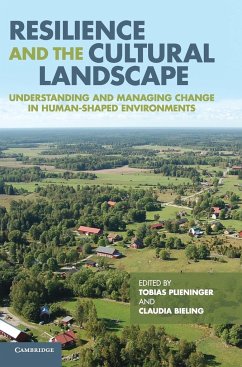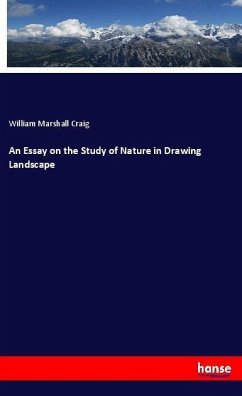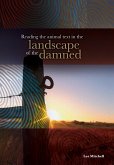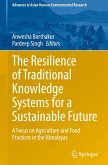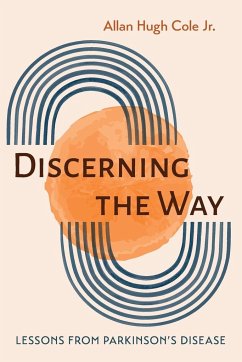Resilience and the Cultural Landscape
Herausgeber: Plieninger, Tobias; Bieling, Claudia
Resilience and the Cultural Landscape
Herausgeber: Plieninger, Tobias; Bieling, Claudia
- Gebundenes Buch
- Merkliste
- Auf die Merkliste
- Bewerten Bewerten
- Teilen
- Produkt teilen
- Produkterinnerung
- Produkterinnerung
This book combines the 'resilience' and 'cultural landscape' approaches to develop a new perspective on analysing and managing landscape changes.
Andere Kunden interessierten sich auch für
![Architecture, Astronomy and Sacred Landscape in Ancient Egypt Architecture, Astronomy and Sacred Landscape in Ancient Egypt]() Giulio MagliArchitecture, Astronomy and Sacred Landscape in Ancient Egypt127,99 €
Giulio MagliArchitecture, Astronomy and Sacred Landscape in Ancient Egypt127,99 €![The Living Landscape of Britain The Living Landscape of Britain]() Walter ShepherdThe Living Landscape of Britain37,99 €
Walter ShepherdThe Living Landscape of Britain37,99 €![An Essay on the Study of Nature in Drawing Landscape An Essay on the Study of Nature in Drawing Landscape]() William Marshall CraigAn Essay on the Study of Nature in Drawing Landscape12,90 €
William Marshall CraigAn Essay on the Study of Nature in Drawing Landscape12,90 €![Reading the Animal Text in the Landscape of the Damned Reading the Animal Text in the Landscape of the Damned]() Les MitchellReading the Animal Text in the Landscape of the Damned56,99 €
Les MitchellReading the Animal Text in the Landscape of the Damned56,99 €![Climate Change and Human Impact on the Landscape Climate Change and Human Impact on the Landscape]() F. M. ChambersClimate Change and Human Impact on the Landscape81,99 €
F. M. ChambersClimate Change and Human Impact on the Landscape81,99 €![The Resilience of Traditional Knowledge Systems for a Sustainable Future The Resilience of Traditional Knowledge Systems for a Sustainable Future]() The Resilience of Traditional Knowledge Systems for a Sustainable Future116,99 €
The Resilience of Traditional Knowledge Systems for a Sustainable Future116,99 €![Discerning the Way Discerning the Way]() Allan Hugh Jr. ColeDiscerning the Way27,99 €
Allan Hugh Jr. ColeDiscerning the Way27,99 €-
-
-
This book combines the 'resilience' and 'cultural landscape' approaches to develop a new perspective on analysing and managing landscape changes.
Hinweis: Dieser Artikel kann nur an eine deutsche Lieferadresse ausgeliefert werden.
Hinweis: Dieser Artikel kann nur an eine deutsche Lieferadresse ausgeliefert werden.
Produktdetails
- Produktdetails
- Verlag: Cambridge University Press
- Seitenzahl: 366
- Erscheinungstermin: 23. Februar 2016
- Englisch
- Abmessung: 250mm x 175mm x 24mm
- Gewicht: 810g
- ISBN-13: 9781107020788
- ISBN-10: 1107020786
- Artikelnr.: 36137159
- Herstellerkennzeichnung
- Libri GmbH
- Europaallee 1
- 36244 Bad Hersfeld
- gpsr@libri.de
- Verlag: Cambridge University Press
- Seitenzahl: 366
- Erscheinungstermin: 23. Februar 2016
- Englisch
- Abmessung: 250mm x 175mm x 24mm
- Gewicht: 810g
- ISBN-13: 9781107020788
- ISBN-10: 1107020786
- Artikelnr.: 36137159
- Herstellerkennzeichnung
- Libri GmbH
- Europaallee 1
- 36244 Bad Hersfeld
- gpsr@libri.de
Preface; 1. Connecting cultural landscapes to resilience Tobias Plieninger
and Claudia Bieling; Part I. Conceptualising Landscapes and
Social-Ecological Systems: 2. Landscapes as integrating frameworks for
human, environmental and policy processes Paul Selman; 3. From cultural
landscapes to resilient social-ecological systems: transformation of a
classical paradigm or a novel approach? Thomas Kirchhoff, Fridolin Brand
and Deborah Hoheisel; 4. Conceptualising the human in cultural landscapes
and resilience thinking Lesley Head; 5. System or arena? Conceptual
concerns around the analysis of landscape dynamics Marie Stenseke, Regina
Lindborg, Annika Dhalberg and Elin Slätmo; 6. Resilience thinking vs.
political ecology: understanding the dynamics of small-scale,
labour-intensive farming landscapes Mats Widgren; Part II. Analysing
Landscape Resilience: 7. In search of resilient behaviour: using the
driving forces framework to study cultural landscapes Matthias Bürgi, Felix
Kienast and Anna M. Hersperger; 8. Cultural landscapes as complex adaptive
systems: the cases of northern Spain and northern Argentina Alejandro J.
Rescia, María E. Pérez-Corona, Paula Arribas-Ureña and John W. Dover; 9.
Linking path dependency and resilience for the analysis of landscape
development Andreas Röhring and Ludger Gailing; 10. The sugar-cane
landscape of the Caribbean islands: resilience, adaptation and
transformation of the plantation social-ecological system William Found and
Marta Berbés-Blázquez; 11. Offshore wind farming on Germany's North Sea
coast: tracing regime shifts across scales Kira Gee and Benjamin Burkhard;
Part III. Managing Landscapes for Resilience: 12. Collective efforts to
manage cultural landscapes for resilience Katrin Prager; 13. Response
strategy assessment: a tool for evaluating resilience for the management of
social-ecological systems Magnus Tuvendal and Thomas Elmqvist; 14.
Ecosystem services and social-ecological resilience in transhumance
cultural landscapes: learning from the past, looking for a future Elisa
Oteros-Rozas, José A. González, Berta Martín-López, César A. López and
Carlos Montes; 15. The role of homegardens in strengthening
social-ecological resilience: case studies from Cuba and Austria Christine
Van der Stege, Brigitte Vogl-Lukasser and Christian R. Vogl; 16. Promises
and pitfalls of adaptive management in resilience thinking: the lens of
political ecology Betsy A. Beymer-Farris, Thomas J. Bassett and Ian
Bryceson; Part IV. Perspectives for Resilient Landscapes: 17. A heterarchy
of knowledges: tools for the study of landscape histories and futures
Carole L. Crumley; 18. Towards a deeper understanding of the social in
resilience: the contributions of cultural landscapes Ann P. Kinzig; 19.
Resilience and cultural landscapes: opportunities, relevance and ways ahead
Claudia Bieling and Tobias Plieninger; Index.
and Claudia Bieling; Part I. Conceptualising Landscapes and
Social-Ecological Systems: 2. Landscapes as integrating frameworks for
human, environmental and policy processes Paul Selman; 3. From cultural
landscapes to resilient social-ecological systems: transformation of a
classical paradigm or a novel approach? Thomas Kirchhoff, Fridolin Brand
and Deborah Hoheisel; 4. Conceptualising the human in cultural landscapes
and resilience thinking Lesley Head; 5. System or arena? Conceptual
concerns around the analysis of landscape dynamics Marie Stenseke, Regina
Lindborg, Annika Dhalberg and Elin Slätmo; 6. Resilience thinking vs.
political ecology: understanding the dynamics of small-scale,
labour-intensive farming landscapes Mats Widgren; Part II. Analysing
Landscape Resilience: 7. In search of resilient behaviour: using the
driving forces framework to study cultural landscapes Matthias Bürgi, Felix
Kienast and Anna M. Hersperger; 8. Cultural landscapes as complex adaptive
systems: the cases of northern Spain and northern Argentina Alejandro J.
Rescia, María E. Pérez-Corona, Paula Arribas-Ureña and John W. Dover; 9.
Linking path dependency and resilience for the analysis of landscape
development Andreas Röhring and Ludger Gailing; 10. The sugar-cane
landscape of the Caribbean islands: resilience, adaptation and
transformation of the plantation social-ecological system William Found and
Marta Berbés-Blázquez; 11. Offshore wind farming on Germany's North Sea
coast: tracing regime shifts across scales Kira Gee and Benjamin Burkhard;
Part III. Managing Landscapes for Resilience: 12. Collective efforts to
manage cultural landscapes for resilience Katrin Prager; 13. Response
strategy assessment: a tool for evaluating resilience for the management of
social-ecological systems Magnus Tuvendal and Thomas Elmqvist; 14.
Ecosystem services and social-ecological resilience in transhumance
cultural landscapes: learning from the past, looking for a future Elisa
Oteros-Rozas, José A. González, Berta Martín-López, César A. López and
Carlos Montes; 15. The role of homegardens in strengthening
social-ecological resilience: case studies from Cuba and Austria Christine
Van der Stege, Brigitte Vogl-Lukasser and Christian R. Vogl; 16. Promises
and pitfalls of adaptive management in resilience thinking: the lens of
political ecology Betsy A. Beymer-Farris, Thomas J. Bassett and Ian
Bryceson; Part IV. Perspectives for Resilient Landscapes: 17. A heterarchy
of knowledges: tools for the study of landscape histories and futures
Carole L. Crumley; 18. Towards a deeper understanding of the social in
resilience: the contributions of cultural landscapes Ann P. Kinzig; 19.
Resilience and cultural landscapes: opportunities, relevance and ways ahead
Claudia Bieling and Tobias Plieninger; Index.
Preface; 1. Connecting cultural landscapes to resilience Tobias Plieninger
and Claudia Bieling; Part I. Conceptualising Landscapes and
Social-Ecological Systems: 2. Landscapes as integrating frameworks for
human, environmental and policy processes Paul Selman; 3. From cultural
landscapes to resilient social-ecological systems: transformation of a
classical paradigm or a novel approach? Thomas Kirchhoff, Fridolin Brand
and Deborah Hoheisel; 4. Conceptualising the human in cultural landscapes
and resilience thinking Lesley Head; 5. System or arena? Conceptual
concerns around the analysis of landscape dynamics Marie Stenseke, Regina
Lindborg, Annika Dhalberg and Elin Slätmo; 6. Resilience thinking vs.
political ecology: understanding the dynamics of small-scale,
labour-intensive farming landscapes Mats Widgren; Part II. Analysing
Landscape Resilience: 7. In search of resilient behaviour: using the
driving forces framework to study cultural landscapes Matthias Bürgi, Felix
Kienast and Anna M. Hersperger; 8. Cultural landscapes as complex adaptive
systems: the cases of northern Spain and northern Argentina Alejandro J.
Rescia, María E. Pérez-Corona, Paula Arribas-Ureña and John W. Dover; 9.
Linking path dependency and resilience for the analysis of landscape
development Andreas Röhring and Ludger Gailing; 10. The sugar-cane
landscape of the Caribbean islands: resilience, adaptation and
transformation of the plantation social-ecological system William Found and
Marta Berbés-Blázquez; 11. Offshore wind farming on Germany's North Sea
coast: tracing regime shifts across scales Kira Gee and Benjamin Burkhard;
Part III. Managing Landscapes for Resilience: 12. Collective efforts to
manage cultural landscapes for resilience Katrin Prager; 13. Response
strategy assessment: a tool for evaluating resilience for the management of
social-ecological systems Magnus Tuvendal and Thomas Elmqvist; 14.
Ecosystem services and social-ecological resilience in transhumance
cultural landscapes: learning from the past, looking for a future Elisa
Oteros-Rozas, José A. González, Berta Martín-López, César A. López and
Carlos Montes; 15. The role of homegardens in strengthening
social-ecological resilience: case studies from Cuba and Austria Christine
Van der Stege, Brigitte Vogl-Lukasser and Christian R. Vogl; 16. Promises
and pitfalls of adaptive management in resilience thinking: the lens of
political ecology Betsy A. Beymer-Farris, Thomas J. Bassett and Ian
Bryceson; Part IV. Perspectives for Resilient Landscapes: 17. A heterarchy
of knowledges: tools for the study of landscape histories and futures
Carole L. Crumley; 18. Towards a deeper understanding of the social in
resilience: the contributions of cultural landscapes Ann P. Kinzig; 19.
Resilience and cultural landscapes: opportunities, relevance and ways ahead
Claudia Bieling and Tobias Plieninger; Index.
and Claudia Bieling; Part I. Conceptualising Landscapes and
Social-Ecological Systems: 2. Landscapes as integrating frameworks for
human, environmental and policy processes Paul Selman; 3. From cultural
landscapes to resilient social-ecological systems: transformation of a
classical paradigm or a novel approach? Thomas Kirchhoff, Fridolin Brand
and Deborah Hoheisel; 4. Conceptualising the human in cultural landscapes
and resilience thinking Lesley Head; 5. System or arena? Conceptual
concerns around the analysis of landscape dynamics Marie Stenseke, Regina
Lindborg, Annika Dhalberg and Elin Slätmo; 6. Resilience thinking vs.
political ecology: understanding the dynamics of small-scale,
labour-intensive farming landscapes Mats Widgren; Part II. Analysing
Landscape Resilience: 7. In search of resilient behaviour: using the
driving forces framework to study cultural landscapes Matthias Bürgi, Felix
Kienast and Anna M. Hersperger; 8. Cultural landscapes as complex adaptive
systems: the cases of northern Spain and northern Argentina Alejandro J.
Rescia, María E. Pérez-Corona, Paula Arribas-Ureña and John W. Dover; 9.
Linking path dependency and resilience for the analysis of landscape
development Andreas Röhring and Ludger Gailing; 10. The sugar-cane
landscape of the Caribbean islands: resilience, adaptation and
transformation of the plantation social-ecological system William Found and
Marta Berbés-Blázquez; 11. Offshore wind farming on Germany's North Sea
coast: tracing regime shifts across scales Kira Gee and Benjamin Burkhard;
Part III. Managing Landscapes for Resilience: 12. Collective efforts to
manage cultural landscapes for resilience Katrin Prager; 13. Response
strategy assessment: a tool for evaluating resilience for the management of
social-ecological systems Magnus Tuvendal and Thomas Elmqvist; 14.
Ecosystem services and social-ecological resilience in transhumance
cultural landscapes: learning from the past, looking for a future Elisa
Oteros-Rozas, José A. González, Berta Martín-López, César A. López and
Carlos Montes; 15. The role of homegardens in strengthening
social-ecological resilience: case studies from Cuba and Austria Christine
Van der Stege, Brigitte Vogl-Lukasser and Christian R. Vogl; 16. Promises
and pitfalls of adaptive management in resilience thinking: the lens of
political ecology Betsy A. Beymer-Farris, Thomas J. Bassett and Ian
Bryceson; Part IV. Perspectives for Resilient Landscapes: 17. A heterarchy
of knowledges: tools for the study of landscape histories and futures
Carole L. Crumley; 18. Towards a deeper understanding of the social in
resilience: the contributions of cultural landscapes Ann P. Kinzig; 19.
Resilience and cultural landscapes: opportunities, relevance and ways ahead
Claudia Bieling and Tobias Plieninger; Index.

